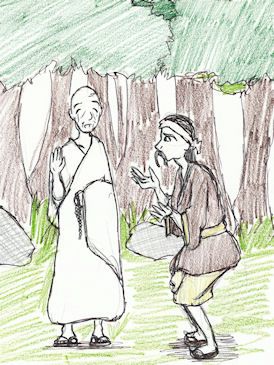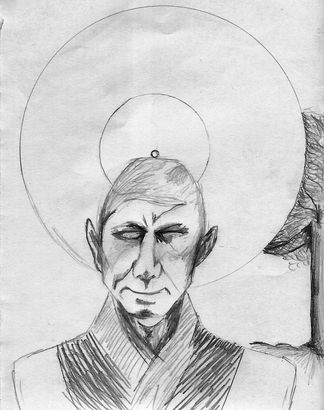
He hurried to see if he could get Ananda to introduce him to the Buddha before the Buddha attained nirvana.
Drawing by Lan-Anh Pham, Sixth College (UCSD), Class of 2011, by permission
As the time drew near for the Buddha to die, Ananda urged him not to do so in the small and wild hamlet of Kushinagari, but to return to a bigger place like Rajagaha or Vaishali. There would be rich people in such places who could arrange things well.
But the Buddha reprimanded him, and told him that Kushinagari was not to be despised, for this tiny circle of huts had once been a flourishing capital from which the holy king Sudarshana (Sudarśana) had once wisely ruled a great realm, very much as the Buddha himself had appeared so that the realm of all the world could be saved. He told Ananda to go and announce to the king and the people of Kushinagari that this evening, in this wood, the Lord of the World would attain his final nirvana. Before this, they could come and see the one who had come to save them.
So Ananda, with heavy heart, took some of the bhikshus and went to see the king of Kushinagari.
When the king of the Malla and his people in Kushinagari heard what Ananda told them, they were extremely sad, and they hurried to the grove of shala trees to see the Buddha for one last time and to honor him and to express their concern.

With them came a wandering heretic Brahman named Subhadra-the-Heretic who was staying in Kushinagari at the time. Subhadra-the-Heretic was said to be 120 years old, and he was thought a heretic on account of the odd opinions he had about everything and the curious questions he asked that nobody could answer. When Subhadra-the-Heretic heard the news about the Buddha, he hurried to see if he could get Ananda to introduce him to the Buddha before the Buddha attained his final nirvana, for only the Buddha was likely to be able to clarify some questions that were troubling him.
Arriving at the wood, Subhadra-the-Heretic asked Ananda over and over to let him talk with the Buddha and ask him the unanswerable questions. And over and over Ananda declined on the grounds that the Buddha was too sick to deal with such issues at this time. But Subhadra-the-Heretic kept asking, and at length their altercation grew so loud that the Buddha overheard them, and wondered what all the shouting was about, for he retained his childhood curiosity throughout his life, and shouting in the presence of a dying man about the way to attain nirvana could only be interesting.
When he knew why Subhadra-the-Heretic had come, the Buddha ordered Ananda to bring the man before him.

Subhadra-the-Heretic approached and asked his questions more reverently than Ananda expected he would, and the Buddha answered him with surprising clarity and strength. Indeed, the Buddha so impressed him and so clarified his mind, that immediately Subhadra-the-Heretic asked permission to join the Buddha’s followers. The Buddha granted his wish, and told Ananda to shave Subhadra-the-Heretic’s head like the others. And thus Subhadra-the-Heretic became the Buddha’s very last bhikshu, just as Ajnata-kaundinya in the Deer Park had become his very first. (V. chapter 13.)
Then the Buddha asked all of them if they had any remaining doubts about his teachings, about the Buddha himself, or the other buddhas past or future, or about the law or about the sangha, in short, about the Three Treasures. And finally he gave them his last instruction: “Nothing is constant, you will be separated from all things. This is unavoidable.”
Then, lying on his side facing west with his head toward the north, he closed his eyes, and he left the cycle of birth and death at the age of 80 in the grove of fragrant shala trees outside the town of Kushinagari under the reign of King Malla in the last hour of the 15th day of the 6th month. He was 80 years old.
Among the Buddha’s followers was a certain Subhadra-the-Barber (no relation to Subhadra-the-Heretic). Subhadra-the-Barber chafed under the Buddha’s restrictions, and when the Buddha was gone, Subhadra-the-Barber proposed to the other bhikshus and bhikshunis that his passing away meant they would now be free of many of those restrictions. This view came to the ears of one of the Buddha’s strictest disciples, Maha-kashyapa (Mahākāśyapa), who was thus inspired to convene the first Great Council, where decisions were made that govern Buddhism still today. That council and the movement(s) growing from it are, of course, another story.
Buddhists say that the Buddha’s teachings, which are the same as the teachings of all buddhas, will continue forever, enabling billions of people to transcend the cycle of birth and death and attain nirvana.